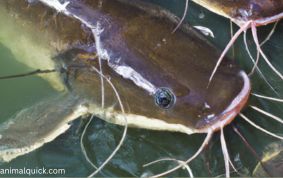Have you ever thought:
- Do Catfish Poop?
- Should I Clean Fish Poop?
- How Do I Get Rid of Fish Poop in My Tank?
In short: Yes, catfish poop.
Do Catfish Poop?
Yes, catfish make poop.
They get rid of it through their gills and rear end.
The poop has things like leftover food, body waste, and stuff their bodies need to get rid of.
5 Surprising Facts:
- Catfish get rid of waste through their mouth as it’s their only opening for both food and poop.
- Catfish poop privately, choosing hidden spots or digging holes to keep their surroundings clean and prevent water problems and sickness.
- Cat poop can tell us about their health. Normal poop means they’re digesting well. Runny, stringy, or no poop could signal digestive problems or illness.
- Catfish poop is great for plants! It has nutrients like nitrogen and phosphorus that plants love. Collecting it is helpful for gardening or aquaponics.
- Electric catfish strategically use their electrifying poop as a defense mechanism, surprising and deterring attackers. This unique ability is the only known instance of weaponized poop in the animal kingdom.
Why is My Fish Pooping Long Strings?
If you see your fish pooping long, stringy stuff, it could mean they have some health problems.
Here are some reasons why:
- Food Issues: If your fish eats the wrong food or doesn’t get a balanced diet, their poop might look weird. Don’t overfeed them; that can cause strange poop too.
- Bugs Inside: Worms and other internal bugs can mess with how to fish poop. If it looks stringy or white, it could be a sign of these bugs.
- Bacteria Trouble: Some bacteria can mess up a fish’s digestion, changing how their poop looks.
- Feeling Stressed: Stress can mess with a fish’s tummy and make their poop different. Sudden water changes, too many fish in one place, or dirty water can stress them out.
- Tummy Problems: Some fish have digestion issues that make their poop look odd.
- Can’t Go Regularly: If a fish is constipated, they might pass long, stringy poop. This could be because of their diet or internal problems.
Should I Clean Fish Poop?
Keeping your aquarium water clean is super important, and one part of that is getting rid of fish waste, like poop.
Fish poop has stuff like ammonia that can harm the fish if it builds up.
Too much ammonia and nitrites can make the water bad, stress out the fish, and even make them sick.
Here’s what you can do to handle fish waste:
- Change the Water Regularly: Swap out some of the water regularly to get rid of built-up waste and put it in fresh, clean water. How often you do this depends on your tank size, the number and type of fish, and how good your filter is.
- Clean the Gravel: Use a gravel vacuum when changing the water to clean up the bottom of the tank. This picks up leftover food, debris, and fish poop that sinks to the bottom.
- Check the Filter: Make sure your filter is working well. Filters help clean out particles and turn harmful stuff like ammonia into less harmful forms.
- Don’t Overfeed: Giving your fish too much food makes more waste in the tank. Feed them the right amount, and remove any extra food after they eat to stop it from making the water dirty.
- Test the Water: Regularly check water stuff like ammonia, nitrites, nitrates, and pH to make sure they’re okay for your specific fish.
How Do I Get Rid of Fish Poop in My Tank?
To effectively keep your fish tank clean and free from waste, including poop.
Follow these steps:
- Regular Water Changes: Change some of the water regularly to remove waste and add fresh water to the tank. The frequency of changes depends on the tank size, number of fish, and filter efficiency. Generally, a 20-30% water change every 1-2 weeks is a good start.
- Use a Gravel Vacuum: When changing water, use a gravel vacuum to clean the tank’s bottom. This helps remove uneaten food, debris, and fish waste.
- Maintain a Good Filtration System: Make sure your filter works well. Mechanical and biological filtration helps clean the water and convert harmful substances like ammonia. Clean or replace filter media as recommended by the manufacturer.
- Avoid Overfeeding: Don’t give your fish too much food. Feed them a balanced diet and remove any excess food to prevent it from rotting.
- Add Bottom-Cleaning Crew: Consider adding bottom-dwelling fish or invertebrates that eat detritus and leftover food, like certain catfish or snails.
- Monitor Water Parameters: Regularly test water for ammonia, nitrites, nitrates, pH, and more to ensure they’re safe for your fish. High ammonia and nitrites can signal poor water quality.
- Quarantine Sick Fish: If a fish seems sick and is adding to waste, isolate it in a separate tank until it recovers to prevent the spread of disease.
What Cleans Up Fish Poop?
Many aquatic creatures can help keep your aquarium clean like snails, shrimp, and cleaner crew invertebrates.
Some types you might consider:
- Snails: Snails are great at eating algae, decaying plants, and extra food. They clean up the tank by munching on debris and tiny particles.
- Shrimp: Certain freshwater shrimp, like cherry or Amano shrimp, are good at picking off debris and algae, helping to tidy up the aquarium.
- Bottom-Dwelling Fish: Catfish and loaches are fish that hang out at the bottom and naturally clean up by searching for and eating leftover food and detritus.
- Corydoras Catfish: These catfish not only look cool but also help clean the tank bottom by scavenging for food.
- Plecos: Plecos are a type of catfish known for eating algae. They keep the tank clean by consuming algae and detritus.
- Cleaner Crew Invertebrates: Small invertebrates like dwarf crayfish and certain snails (like Nerite snails) can also contribute to the clean-up crew by eating debris and algae.
Read More:
- Do Betta Fish Need a Heater?
- Are Catfish Bottom Feeders?
- Does Catfish Have Bones?
- Rohu Fish Benefits and Side Effects
- Why is Basa Fish Banned?

I love animals & want to know more about different creatures & sharing their stories with everyone. From my childhood, I’ve been exploring forests & watching animals in their homes.
Now, I write about my adventures & all the amazing things I learned. My blogs are easy to understand & make you want to know more about animals. I teach about why animals are important & why we should take care of them.

